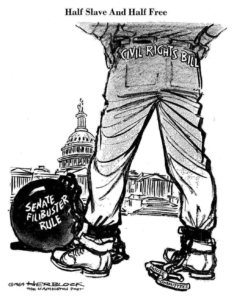The Civil Rights Filibuster Returns With A Vengeance
FRED WERTHEIMER’S WEEKLY NOTE | November 11, 2021
One of the most famous Senate filibusters occurred in 1957, when South Carolina Senator Strom Thurmond held the Senate floor for more than 24 hours in an effort to block passage of the Civil Rights Act of 1957.
The filibuster ultimately failed, and the Act – though weakened by opponents – became the first civil rights legislation passed by Congress since 1875.
Prior to 1957, Senate filibusters had been used for decades to block anti-lynching legislation, poll tax bans, anti-discrimination legislation, and other civil rights and voting rights measures.
Then in 1964, Congress enacted the historic Civil Rights Act of 1964 – overcoming a filibuster that lasted 60 days. Passage of the Voting Rights Act of 1965 followed. It seemed that the era of using obstructionist filibusters to block vital civil rights measures had, finally, ended.
This year, however, the civil rights filibuster has come back with a vengeance.
In 2021, Republican-led state legislatures around the country have enacted a wave of voter suppression laws, in particular aimed at preventing Black and brown voters, as well as the disabled and other minorities, from exercising their sacred right to vote.
State legislatures have also enacted new laws this year to politicize the administration of elections, setting the stage for partisan election officials to rig the outcome of federal elections.
In Congress, Senate Republicans have been using filibusters to block the passage of civil rights legislation that would override these state voter suppression laws and prevent them from applying to federal elections. These measures would also provide ways to prevent partisan state election officials from hijacking congressional and presidential elections.
Washington Post columnist E.J. Dionne Jr. has rightly called the voting rights fight in Congress this year “the pivotal civil rights battle of our time.”
Led by Senator Mitch McConnell (R-KY), Senate Republicans have in recent years turned the filibuster into a partisan weapon used by the minority to control the majority and to prevent the Senate from acting on almost every major matter unless the measure fits into reconciliation bills that can be passed by majority vote.
Since June, Republican filibusters have blocked even debating three voting rights bills – the For the People Act, a revised version of that legislation called the Freedom to Vote Act, and the John Lewis Voting Rights Advancement Act. In total, just one Senate Republican voted just once for cloture to end just one of the filibusters.
The right to vote is the heart and soul of our democracy. Senate supporters must find a way to pass the voting rights legislation without being blocked by a minority filibuster.
__________
Herblock cartoon (1964), courtesy of The Herb Block Foundation.
Fred’s Weekly Note appears each Thursday in Wertheimer’s Political Report, a Democracy 21 newsletter. Read this week’s newsletter here. Or, subscribe for free here and receive your copy each week via email.
# # #
